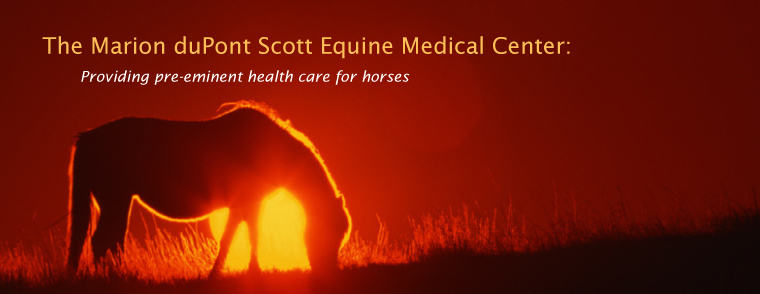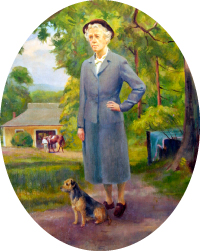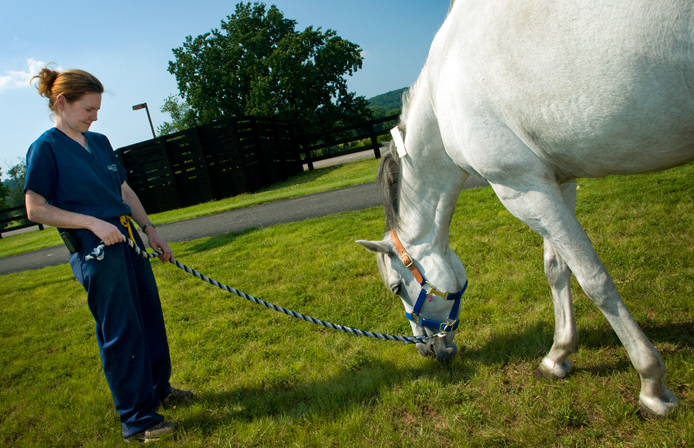 |
|
 by CATHLEEN LEE |
|
Inside a stately brick hospital in Loudoun County, some of the nation's leading equine veterinarians are providing 21st-century health care for horses ranging from flat-track superstars and hunter-jumpers to paddock pets. The Marion duPont Scott Equine Medical Center (EMC), located on 200 rolling acres in Leesburg, Va., opened on Oct. 14, 1984. As the population and needs of the region have grown, the Equine Medical Center has grown as well. In its first year of operation, it welcomed 760 patients; in 2008, the caseload reached 3,000. In 1984, the center was comprised of three faculty veterinarians and 18 employees. Today, 10 faculty members and approximately 100 staff members work at the EMC. Originally, the center featured a 29-stall barn. Now, after the addition of two separate barns, the EMC can accommodate 51 patients at any given time--to date, more than 45,000 horses have been admitted to the hospital. Most recently, the center opened a new research lab, which is equipped to investigate the molecular aspects of disease and injury. The research lab is expected to help faculty researchers discover treatments that will improve health care--and not necessarily just for horses.Client and patient care The EMC boasts a sterling reputation as a premier full-service equine health care facility, one of only eight full-service veterinary teaching hospitals on the East Coast. Part of the Virginia-Maryland Regional College of Veterinary Medicine (VMRCVM), the Equine Medical Center is the only stand-alone teaching hospital in North America devoted to equine medicine and surgery, providing a vital, hands-on learning experience for the next generation of equine veterinarians and specialists. Operating 24 hours a day, 365 days a year, the center provides services that its clients have come to expect, appreciate, and rely upon. Many cases involve emergencies, such as fractures, colic, infectious disease, performance problems, and neonatal diseases in foals. It is not unusual to have three veterinarians, a veterinary technician, veterinary students, and a variety of staff members seeing to a horse that has just been admitted. The center's high success rate is due to continuous monitoring, which is key to detecting changes in horses' vital signs so that treatment can be administered quickly.The range of services offered is comprehensive. Diagnostics cover the spectrum of care: two radiology suites, an MRI unit, a nuclear scintigraphy imaging suite, two surgical suites with four induction/recovery stalls, a five-stall intensive-care unit, an eight-stall isolation unit, a clinical laboratory, a pharmacy, a farrier shop, and a high-speed treadmill. A newly constructed 12-stall barn is ready for outpatient stabling. Specialized equipment includes surgical lasers, arthroscopes, bone-plating equipment, digital and computed radiography, high-resolution ultrasound, and endoscopes sized for equine patients. As extraordinary as the facilities and equipment are, however, the center's greatest asset is its faculty and staff--their knowledge, experience, and expertise are second to none. Each faculty member is board certified in surgery, internal medicine, or anesthesia, and the staff includes licensed technicians as well as competent, compassionate support personnel.Engaging the community The center continually strives to be a resource for the equine enthusiasts in the commonwealth, offering tours of its facilities to anyone interested in learning more about its services and veterinary medicine. From pony clubs to local school groups and from curious individuals to prospective veterinary students, thousands of people have enjoyed guided tours of the center. Education about equine health issues is also at the forefront of the effort to give back to the community. Tuesday Talks--free lectures presented by faculty on topics related to equine health--have drawn hordes of horse enthusiasts to the center. These lectures have touched on subjects from colic to cancer, from nutrition to neonates, and everything in between. As well, the center's website at www.equinemedicalcenter.net is frequently updated to provide useful information on a wide variety of subjects to a broad audience.
CATHLEEN LEE is public relations coordinator for the Equine Medical Center. |
|||||||||||||||||||||||||||||||
|
|

